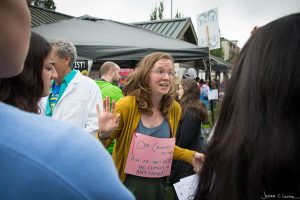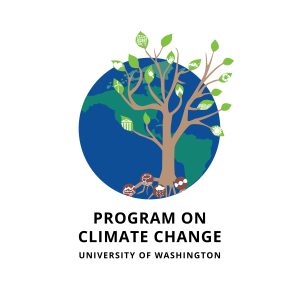All (Undergraduates) Deserve A Climate Education
As Earth’s atmosphere, land, and oceans heat and host increasing amounts of fossil carbon, humanity struggles with one of the biggest challenges of our time, anthropogenic climate change. This struggle is ever more apparent at every level of society. How we address this challenge will determine our future as well as that of many species on the planet. Yet, according to the Yale Climate Opinion Survey results of 2023, over 60% of us in the U.S. rarely or never talk to each other about climate change or hear about climate change in the media.
It’s complicated. It is still a stretch to consider the climate when researching a new vehicle or replacing a worn-out home heating system. It may not be apparent that ultimately it is climate change we are preparing for when we develop a plan for what to do when the power goes out. Climate change is deeply engrained as a part of our current and future lives, but so many people still don’t realize it.
There is an increasing body of climate-focused literature, both fiction and non-fiction, set to support, shock, and inform. For many of us who work on climate change every day, setting oneself in the altered world of a fictional near future is heart wrenching. These works speak to the angst we feel about the possibilities of losing so much. Over the last few years, I co-taught a course on “The Science and Narratives of Climate” at UW Bothell as part of the Discovery Core program that incorporated world building in communities different from what students are familiar. Students were invited to envision a future that results from actions that, if taken now, will improve the future of the planet.
I now host a climate book club in my city designed to support members of the community as they embark on their own climate journey. My daughter suggested we read “Migrations” by Charlotte McConaghy. It is one of those devastating books that reached deep inside to the parts of me which I must deny every day to be emotionally able to continue the work that I do. I recommend this book unequivocally but with a strong warning that it is not kind. I do hope to have the courage to suggest and discuss the story with the book club.

We continue, we pursue what may not be possible, we persist when that seems insane. This is important. Read the book. Look for classes that can guide you to participate in solutions. Engage in the topic with as many people and as often as you can. And form your community. For undergraduates at UW Seattle, here are some options.
A Resource for Undergraduate Students and Departmental Advisors
To contribute to building a climate literate society that is engaged in addressing climate change we, the UW Program on Climate Change, offer students a living roadmap to an interdisciplinary climate education. This new resource will evolve as new courses develop, and currently provides students a selection of more than fifty courses that address climate, most at the 300/400 level, from nearly 20 different departments across UW. Many are suitable for completing the climate science minor or a student’s major. Courses are grouped according to five topics intended to guide students through understanding: the underlying causes of global warming, pathways to mitigate warming and how to build community resilience to climate change.
The Five Course Groupings in the Self-Directed Climate Education Resource
Students are first directed to courses that lay the scientific foundation for developing sustainable solutions, “Basics of Climate Change and the Carbon Cycle.” These 200 and 300 level courses teach the basics of radiation balance, the greenhouse effect, and how the carbon cycle works.
For students with a keen interest in developing quantitative skill in earth system science, look to the courses, largely from Atms, Ocean and ESS in the “Cycles, Systems, Modeling and Computation” grouping.
Want to learn more about how the big changes in the climate system, warming and increased CO2, impact biological systems? See courses from Biology, Env Health, ESRM and more in the “Impacts, Management, Mitigation and Adaptation” grouping.
The fact that we understand so much of the science and impacts and that we have management ideas, begs the question: Why are we where we are today? You can find discussions of this and much more in courses offered in many of UW’s social science focused departments, listed in the “Politics, Humanities, Communications, Social Science and Ethics” group.
The UW is also a dynamic place for engineers, landscape architects and others who are engaging in solutions and adaptation of our cities. You’ll find that list under “Energy and Solutions”.
Course offerings are continually evolving, and we will happily add to the list. Email uwpcc@uw.edu.
 A Rich History of Climate Education
A Rich History of Climate Education
The PCC’s roots are in graduate education and fostering interdisciplinary climate research. The same needs that we recognized for graduate students over 20 years ago are now clearly apparent for our undergraduates, who recently created the Undergraduate Cohort, UCo, a Registered Student Organization (RSO), with goals to address undergraduate participation in the climate crisis, from research opportunities to career planning.
Our approach in developing this course listing was to provide students with a resource that builds on the climate science minor focus on science and solutions. Already, undergraduate feedback is enthusiastic!
“As an engineering student passionate about the environment, the climate pathways from the PCC have been a great way to get involved in environmental science outside my major!” -A UCo member
“Having the climate pathways has been really helpful as it serves as a course guide where I can quickly identify courses offered throughout the year within climate related topics. I tend to refer to the first two pathways as they involve developing key understandings of the climate system while discussing impacts and solutions centered around mitigation and adaptation, which complement my major and are also incorporated with the climate science minor. I have taken a couple of classes from these pathways and can affirm that each class examines different aspects of the climate through a diversity of disciplines, making this a great online resource for interdisciplinary topics and areas of future research.” – Luciana, ESRM undergraduate
If you want to include a focus on the Atmosphere and Climate, there is a major for you at UW. UW also offers a major in Environmental Studies and a minor in Climate Science. This effort to map climate related opportunities for undergraduates from across UW is also part of a growing national movement to offer interdisciplinary climate studies programs that require all undergraduates to take a single course in climate. For example, UC San Diego requires completion of a 1-quarter course from an approved list, similar in concept to the UW’s Natural World requirement. Students at UC Irvine founded “Sustainable & Just Future.” This Gen-Z led program aims to close gaps in environmental education and to make comprehensive climate education accessible to everyone, regardless of their major. Their members are currently surveying UW undergrads about what they need and want in climate education. Undergraduates are invited to participate in the survey here.
What future do you want? How will you work for it?
-Written by Miriam Bertram, Assistant Director and Academic Program Advisor, UW Program on Climate Change